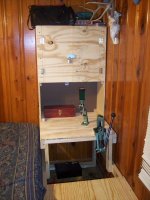viper12161
New member
Hello all,
I recently picked up and mounted a Lee Turret press. My garage has a long bench along the wall that was already built and there when I moved in. It's great space wise for reloading. The only issue is that it is only 30" off the floor. Even sitting, I still need to bend over to fully push down the press lever. I loaded 200 rounds of the other night and my back was killing me after. I would like to raise it up a bit. I was thinking 8" to 10" would be perfect. Was thinking of using some 4x4's with brackets to hold them to the bench and then top with some 3/4" ply. Basically make a big box to attach the press too. Anyone have thoughts on this, or any other ideas? Maybe a press mount that would work? I looked at the Dillon mount and I think that said it raises the press 8", but it sounds like they only fit the Dillon presses.
Thanks!
I recently picked up and mounted a Lee Turret press. My garage has a long bench along the wall that was already built and there when I moved in. It's great space wise for reloading. The only issue is that it is only 30" off the floor. Even sitting, I still need to bend over to fully push down the press lever. I loaded 200 rounds of the other night and my back was killing me after. I would like to raise it up a bit. I was thinking 8" to 10" would be perfect. Was thinking of using some 4x4's with brackets to hold them to the bench and then top with some 3/4" ply. Basically make a big box to attach the press too. Anyone have thoughts on this, or any other ideas? Maybe a press mount that would work? I looked at the Dillon mount and I think that said it raises the press 8", but it sounds like they only fit the Dillon presses.
Thanks!




